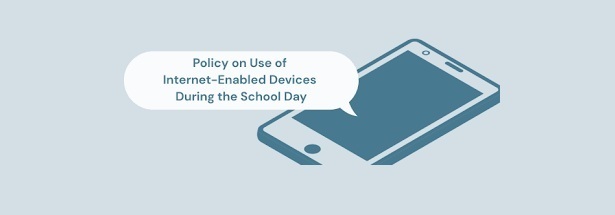STUDENTS AND PERSONAL ELECTRONIC DEVICES
The Board of Education recognizes that students may have personal electronic devices that can perform different functions. Such devices include “internet-enabled devices” defined as: any smartphone, tablet, smartwatch or other device capable of connecting to the internet and enabling the user to access content on the internet, including social media applications, but do not include any such device supplied by the district for educational purposes. These devices can create significant distraction to the school environment, negatively impact student mental health, contribute to disciplinary infractions, and reduce student engagement. Additionally, in an emergency, the use of personal electronic devices can distract students from following the directions of staff or emergency responders, contribute to the spread of misinformation, create congestion in the emergency response system, and interfere with the district’s emergency response protocols.
Generally, the district is not responsible for stolen, lost or damaged personal electronic devices brought to school.
Communication with Parents/Persons in Parental Relation
During the school day, to minimize distractions, parents (which, for purposes of this policy, includes persons in parental relation) may contact their children via the following methods: calling the school office or emailing the district-provided email address. The district will notify parents in writing of the communication protocol at the beginning of each school year and upon enrollment.
Device Access and Storage
As required by Education Law §2803, this policy prohibits student use of internet-enabled devices during the school day (including all classes, homeroom periods, lunch, recess, study halls, and passing time) on school grounds (any building, structure, athletic playing field, playground, or land contained within the boundary of a school or district or BOCES facility), unless under an exception (e.g., IEP/Section 504 or as permitted below).
1. At the elementary school level, students are discouraged from bringing devices to school. Any device that is brought to school must be silenced and kept in the student’s personal cubby.
2. At the middle school level, student devices must be silenced and stored in student lockers or backpacks.
3. At the high school level, student devices must be silenced and stored in student lockers or backpacks.
At the recommendation of the Superintendent of Schools, the district may opt in to locked storage devices.
Exceptions for Specific Purposes
Use of internet-enabled devices must be permitted where included in a student’s Individualized Education Program, Section 504 plan, or where required by law. Additionally, the district permits the use of internet-enabled devices in the event of an emergency, and under the following circumstances:
1. Where necessary to manage a student’s healthcare (e.g., diabetes, asthma, medication, etc.);
2. For students who are routinely responsible for the care and wellbeing of a family member (on a case-by-case basis, upon review and determination by a school psychologist, school social worker, or school counselor).
Parents may request an exception for their children to use internet-enabled devices during the school day as listed above. Requests must be made to the Building Principal, and for healthcare exceptions, must include documentation from an appropriate healthcare professional.
The district provides students with one-to-one devices; therefore, personal electronic devices are not permitted for educational purposes.
Enforcement, Consequences and Reporting
Enforcement of this policy is chiefly the responsibility of building administrative staff; however, all designated employees are expected to assist in enforcement. Students will be reminded of this policy regularly and consistently, especially at the start of the school year and after returning from breaks.
For students out of compliance with this policy, the device will be held in the school office until the end of the school day.
Administrators will also discuss the aims of this policy with students and their parents, the benefits of a distraction-free environment, the reasons the student had difficulty following this policy, and how the district can help the student contribute to a distraction-free environment.
The district may not impose suspension from school if the sole grounds for the suspension is that the student accessed an internet-enabled device as prohibited by this policy. However, the district may utilize consequences under the district’s Code of Conduct, including detention, in-school suspension, and exclusion from extracurricular activities. The district may also utilize assignments on the detrimental impact of social media on mental health, smartphones in school, or other relevant topics.
Some uses of personal electronic devices may constitute a violation of the school district Code of Conduct or other district policies, and in some instances, the law. The district will cooperate with law enforcement officials as appropriate.
Beginning September 1, 2026 and annually thereafter, the district will publish an annual report on its website detailing the enforcement of this policy over the past year, including non-identifiable demographic information of students who have faced disciplinary action for non-compliance with this policy, and an analysis of any demographic disparities in enforcement of this policy. If a statistically significant disparate enforcement impact is identified, the report will include a plan to mitigate such disparate enforcement.
Electronic Devices and Testing
To ensure the integrity of testing, in accordance with state guidelines, students may not bring cell phones or other electronic devices into classrooms or other exam locations during all testing.
Test proctors, monitors and school officials have the right to collect cell phones and other prohibited electronic devices prior to the start of the test and to hold them for the duration of the test taking time. Admission to the test will be prohibited to any student who has a cell phone or other electronic device in their possession and does not relinquish it.
Students with Individualized Education Plans, Section 504 Plans, or documentation from medical practitioners specifically requiring use of electronic devices may do so as specified.
Cross-ref: 4526, Computer Use in Instruction
4526.1, Internet Safety
5300, Code of Conduct
Ref: Education Law §2803
Price v. New York City Board of Education, 51 A.D.3d 277, lv. to appeal denied, 11 N.Y.3d 702 (2008) (District may ban possession of cell phones on school property)
NYSED, Prohibition of Cell Phones and Electronic Devices in New York State Assessments, www.nysed.gov/educator-integrity/prohibition-cell-phones-and-electronic-devices-new-york-state-assessments

